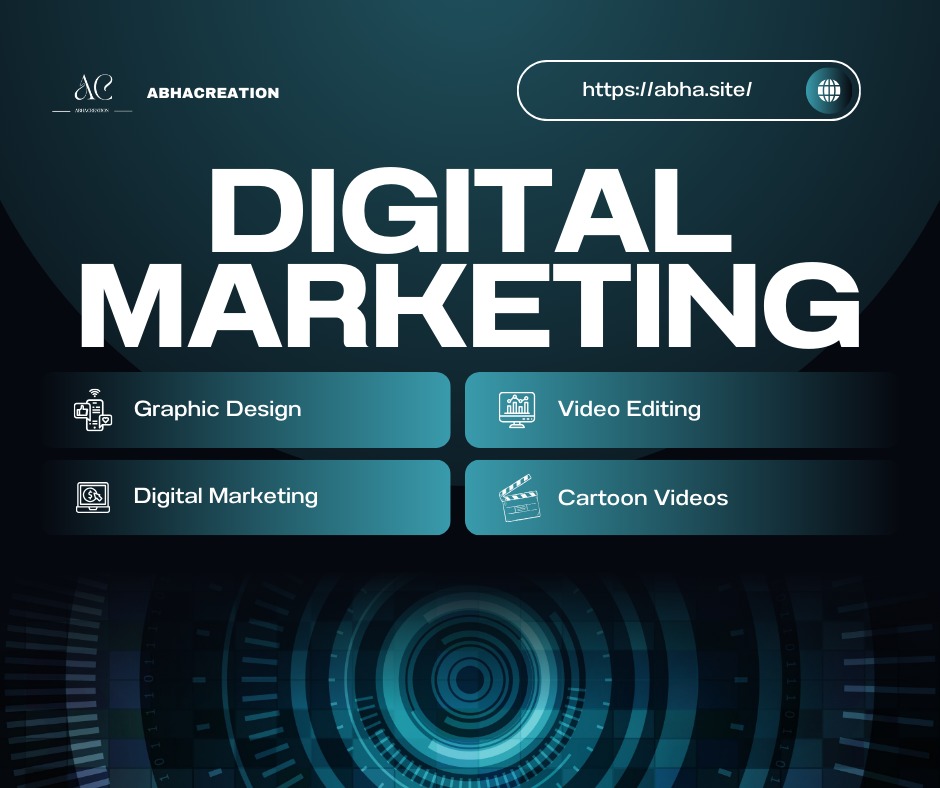Digital Marketing
Abha creation's digital marketing blog offers exert tips , strategies , and insights on SEO , social media , content marketing , and online advertising , empowering businesses to thrive and success in the digital landscape .
4/8/20254 min read


My post content
Title: Unlocking the Power of Digital Marketing: A Comprehensive Guide
In today’s fast-paced, technology-driven world, digital marketing has become a crucial strategy for businesses looking to reach a broader audience, boost brand awareness, and drive sales. Whether you're a small business owner or running a large corporation, understanding the significance of digital marketing can be a game-changer for your brand. In this blog post, we’ll explore the key components of digital marketing and how it can help elevate your business.
What is Digital Marketing?
Digital marketing refers to all the marketing efforts that use an electronic device or the internet. It includes strategies like search engine optimization (SEO), social media marketing, email marketing, content marketing, and more. Digital marketing helps businesses connect with their target audience in a more personalized, measurable, and interactive way.
Why is Digital Marketing Important?
Global Reach
With the internet being accessible worldwide, digital marketing allows businesses to reach a global audience at a fraction of the cost of traditional advertising methods.Cost-Effectiveness
Compared to traditional marketing like TV or print ads, digital marketing offers a more affordable and scalable solution for businesses of all sizes.Better ROI
Digital marketing strategies such as SEO, social media marketing, and pay-per-click (PPC) advertising can help businesses see a higher return on investment (ROI) due to their targeted nature and the ability to measure results in real-time.Targeted Audience
Unlike traditional marketing, digital marketing lets you target specific demographics, interests, and behaviors, ensuring your content reaches the most relevant people.Measurable Results
One of the key benefits of digital marketing is the ability to track and measure results with precision. Analytics tools allow you to see how well your campaigns are performing and adjust accordingly for maximum impact.
Key Components of Digital Marketing
Search Engine Optimization (SEO)
SEO is the backbone of digital marketing. It involves optimizing your website and content to rank higher in search engine results pages (SERPs). By targeting relevant keywords, improving site speed, and creating high-quality content, you can increase organic traffic to your site. Good SEO practices also improve the user experience and make your site more accessible.Content Marketing
Content is king in the world of digital marketing. Blogging, video creation, infographics, and other forms of content not only attract traffic but also engage and inform your audience. Quality content drives conversions and positions your brand as an authority in your niche.Social Media Marketing
Social media platforms like Facebook, Instagram, LinkedIn, and Twitter are powerful tools for promoting your brand. By consistently posting valuable content and engaging with your audience, you can build a loyal community, increase brand awareness, and drive traffic to your website.Pay-Per-Click (PPC) Advertising
PPC ads allow businesses to display ads to potential customers and only pay when the ad is clicked. Google Ads, Facebook Ads, and LinkedIn Ads are common platforms used for PPC advertising. PPC can drive immediate traffic and leads, especially when combined with SEO efforts.Email Marketing
Email marketing remains one of the most effective ways to communicate directly with your audience. Through newsletters, promotions, and personalized emails, businesses can nurture leads, build relationships, and encourage repeat customers.Influencer Marketing
Partnering with influencers who have a large following can help you reach new audiences and increase brand trust. Influencers provide credibility and exposure, which can significantly boost sales and brand visibility.
How to Build a Successful Digital Marketing Strategy
Define Your Goals
The first step in creating a digital marketing strategy is to define clear and measurable goals. Whether it’s increasing website traffic, generating leads, or boosting sales, having specific objectives will guide your strategy and tactics.Know Your Audience
Understanding your target audience is crucial. Use analytics and data to learn about their behavior, interests, and needs. This information will help you create more targeted campaigns that resonate with your audience.Choose the Right Channels
Based on your goals and audience, select the digital marketing channels that will work best for your business. Whether it’s SEO, content marketing, social media, or email, focus on the channels that give you the best ROI.Create Quality Content
Content is what will engage and retain your audience. Ensure your content is valuable, informative, and aligned with your brand’s voice. High-quality content also boosts SEO and can be shared across social media platforms, increasing your reach.Track and Measure Performance
Regularly track the performance of your digital marketing efforts using tools like Google Analytics, social media insights, and email marketing reports. This data will help you optimize your strategy and achieve better results.
Future Trends in Digital Marketing
Digital marketing is constantly evolving. Some emerging trends that businesses should watch out for in the coming years include:
Voice Search Optimization: As voice assistants like Alexa and Google Home become more popular, optimizing content for voice search is becoming essential.
Video Marketing: Video content is dominating online platforms, and businesses are increasingly using video for product demonstrations, customer testimonials, and behind-the-scenes content.
Artificial Intelligence (AI): AI is revolutionizing digital marketing by providing insights into customer behavior, personalizing user experiences, and automating repetitive tasks.
Conclusion
Digital marketing is essential for any business looking to thrive in the modern world. By understanding its core components and implementing a well-rounded strategy, businesses can reach their target audience more effectively, drive conversions, and achieve sustainable growth. Stay ahead of the curve by adapting to new trends and consistently improving your digital marketing efforts.
Ready to get started? Dive into the world of digital marketing today and watch your business grow!
